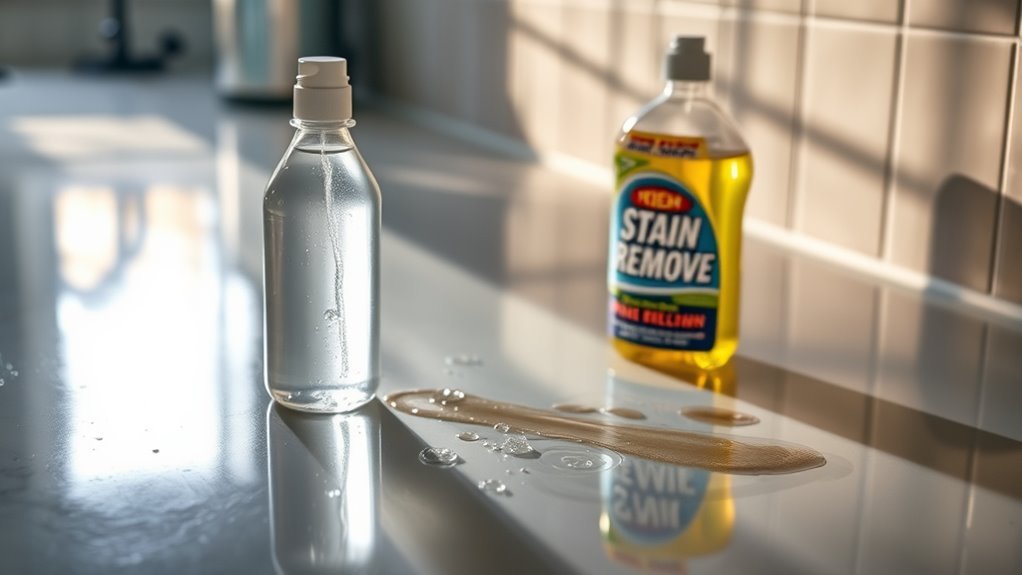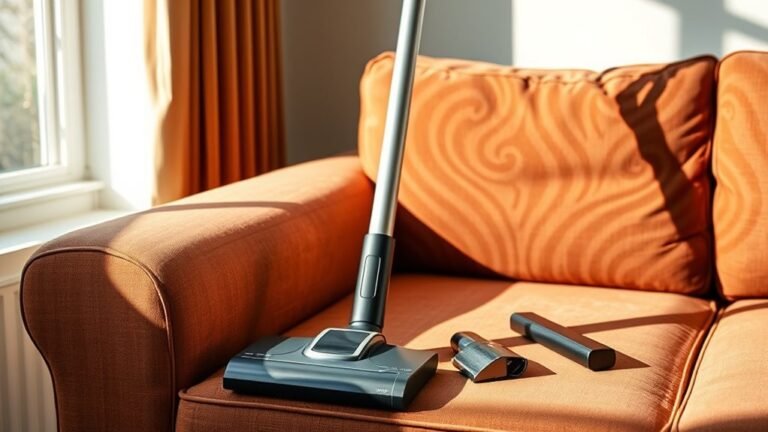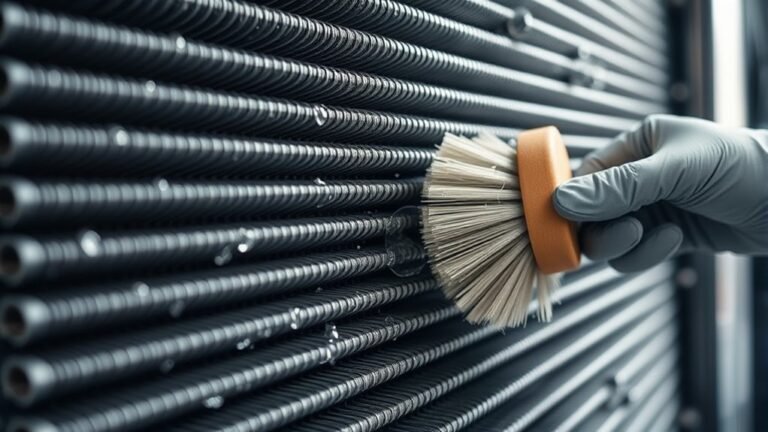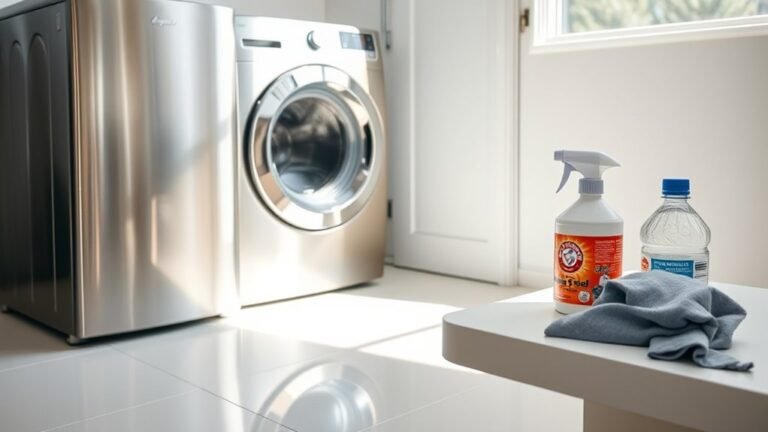Best Stains for Cleaning Grease
When tackling grease stains, you’ll want products with enzymes like lipase, surfactants, and solvents that break down oil effectively. Dish soaps and commercial removers like OxiClean or Shout work great because they cut through grease quickly. For DIY options, baking soda and vinegar solutions also help lift stains without harsh chemicals. Acting fast and pre-treating properly can make a big difference. If you keep going, you’ll uncover tips for different fabrics and smart ways to prevent stains altogether.
Understanding Grease Stains and Their Challenges

Although grease stains might seem straightforward to tackle, they can be surprisingly stubborn because they’re made of oils that cling tightly to fabrics and surfaces. When you understand grease composition, you realize it’s a mix of fats and oils that resist water, making stains hard to remove. This resistance is why stain permanence becomes a real issue if you don’t act quickly. Grease penetrates deep into fibers, setting itself firmly and making ordinary cleaning methods ineffective. If you want freedom from lingering marks, you need to appreciate how these oily substances behave. Recognizing the challenge grease stains pose is the first step to reclaiming your fabrics and surfaces without frustration or damage. You deserve solutions that work as hard as you do.
Key Ingredients to Look for in Grease Stain Removers
Now that you know why grease stains can be so stubborn, it’s helpful to understand what makes a stain remover effective against them. When searching for the best solution, focus on the key ingredients that target grease specifically. Enzymes, especially lipase, break down the oils at the molecular level, boosting stain effectiveness. Surfactants are another must-have; they lift and dissolve grease, making it easier to wash away. Solvents help break down the thick, oily residue, while degreasers cut through heavy buildup quickly. You want a remover that combines these ingredients, giving you a powerful yet gentle formula. By knowing what’s inside, you can confidently pick a product that frees your clothes and surfaces from grease without hassle.
Top Commercial Stain Removers for Grease

Finding the right commercial stain remover can make tackling grease stains much easier. When you want freedom from stubborn spots, choosing from top rated brands guarantees you get powerful, reliable results. Brands like OxiClean, Zout, and Shout often lead stain remover reviews for their effectiveness on greasy messes. These products combine strong enzymes and solvents designed specifically to break down oils without damaging fabrics. Checking recent stain remover reviews helps you pick one that suits your needs, whether for delicate clothes or heavy-duty fabrics. By trusting these proven options, you won’t waste time or effort, and you can confidently restore your garments. Embrace the freedom of clean clothes with a commercial remover that works as hard as you do.
Homemade Solutions for Removing Grease Stains
You don’t need fancy products to tackle grease stains—common household ingredients can do the trick. Knowing how to apply these solutions properly makes all the difference. Let’s explore some easy tips and techniques you can try at home.
Common Household Ingredients
Grease stains can be stubborn, but you don’t need expensive cleaners to tackle them. Common household ingredients like baking soda and a vinegar solution are powerful allies. Baking soda acts as a gentle abrasive, lifting grease without damaging fabric or surfaces. Sprinkle it directly on the stain to absorb the oil before brushing it off. Meanwhile, a vinegar solution—mix equal parts white vinegar and water—breaks down grease naturally, cutting through grime with ease. You can apply it with a spray bottle or cloth for quick, effective cleaning. These ingredients give you freedom from harsh chemicals and costly products, making grease removal simple and eco-friendly. Using what you already have at home means you’re ready to fight grease anytime, anywhere.
Application Techniques and Tips
Although homemade solutions are effective, applying them correctly makes all the difference in removing grease stains. You want to start by blotting excess grease gently—rubbing only pushes the stain deeper. Then, choose your homemade solution and apply it directly to the stain using a clean cloth or soft brush. These application methods guarantee the stain removal agents penetrate well without damaging the fabric. Let the solution sit for 10-15 minutes to break down the grease before rinsing with warm water. For tougher stains, repeat the process, but avoid over-saturating the fabric to prevent spreading. Always test on a hidden area first to maintain freedom over your clothes’ integrity. With the right technique, you’ll reclaim your garments from stubborn grease effortlessly.
Using Dish Soap as a Grease Stain Remover

When grease stains appear on your clothes, dish soap can be a surprisingly effective solution since it’s designed to cut through oils on dishes. You’ll appreciate dish soap benefits like its grease-fighting power and accessibility, making it a go-to stain remover. To get the best results, focus on the ideal dilution—mix a few drops of dish soap with warm water to avoid damaging your fabric. Apply this mixture directly to the stain and gently rub it in, letting it sit for about 5–10 minutes. Then, rinse with warm water before tossing your clothing into the wash. This simple method gives you freedom from stubborn grease marks without harsh chemicals or expensive products, letting you handle stains efficiently and confidently.
Natural Enzymatic Cleaners and Their Effectiveness
If you’ve ever struggled with stubborn oil stains, natural enzymatic cleaners can be a game-changer. These cleaners use natural enzymes to break down grease at a molecular level, making it easier for you to remove tough stains without harsh chemicals. The cleaning effectiveness of natural enzymes comes from their ability to target and digest fats, proteins, and oils, which are common components of grease stains. When you choose a natural enzymatic cleaner, you’re not only opting for a powerful stain remover but also a solution that’s safer for your fabrics and the environment. This freedom from harmful substances means you can tackle grease confidently, knowing you’re protecting both your belongings and your health. Natural enzymes truly redefine what effective, eco-friendly cleaning looks like.
Tips for Pre-Treating Grease Stains Before Washing
Natural enzymatic cleaners work wonders on grease, but getting the stain ready before washing can make a big difference in results. To maximize your success, focus on effective pre treatment methods that tackle the grease head-on. Start by gently blotting excess oil—never rub, as that spreads the stain. Applying a bit of dish soap or a specialized grease remover directly to the spot helps break down oil molecules. Remember, stain removal timing is critical; the sooner you act, the easier it is to lift the grease. Let your pre treatment sit for 10-15 minutes before tossing the item in the wash. By taking these simple steps, you keep your freedom to wear what you love without worrying about stubborn grease stains ruining your day.
How to Remove Grease Stains From Different Fabrics
Although grease stains can seem stubborn, knowing how to treat them based on the fabric type makes all the difference. For cotton fabrics, you can be bold—apply a bit of dish soap directly to the stain, gently rub it in, then rinse with warm water before washing as usual. Cotton handles this well and lets you act fast. Synthetic fabrics need a gentler touch to avoid damage. Use a mild detergent mixed with warm water, dab the stain carefully, and avoid scrubbing hard. Always check fabric care labels to keep your clothes looking free and fresh. With the right approach, you’re in control, freeing your wardrobe from grease marks without worry. Tailoring your method to fabric type guarantees freedom from stains and frustration alike.
Preventative Measures to Avoid Grease Stains
To keep grease stains from ruining your clothes, it helps to practice protective kitchen habits like wearing aprons and handling oily foods carefully. When spills happen, acting quickly to blot and treat the spot can prevent it from setting. These simple steps go a long way in avoiding tough grease stains later on.
Protective Kitchen Practices
How can you keep your kitchen surfaces free from stubborn grease stains? It starts with smart kitchen organization. By arranging your cooking tools and ingredients thoughtfully, you reduce clutter that invites spills and splatters. Use grease containment methods like splash guards, lids, and trays to catch oily messes before they reach your counters or stove. Keeping your kitchen tidy also means wiping down surfaces regularly to prevent buildup. Don’t forget to designate specific areas for greasy tasks, so you can contain potential messes and clean up faster. These protective kitchen practices give you the freedom to cook boldly without worrying about stains setting in. With a little planning and consistency, you’ll maintain a clean, grease-free kitchen environment effortlessly.
Immediate Spill Response
One of the quickest ways to prevent grease stains from setting is to act immediately when spills happen. When you embrace quick action, you take control, stopping grease from embedding into fabrics or surfaces. Effective spill management starts with blotting the excess grease gently—never rubbing, as that pushes it deeper. Use absorbent materials like paper towels or cloths to lift the grease without spreading it. Once the initial grease is contained, treat the area with an appropriate stain remover to break down oils before they bond. By responding swiftly, you’re not just cleaning—you’re preserving your freedom from stubborn stains and extra work later. Remember, your power lies in how fast and smart you handle those unexpected grease spills.
Frequently Asked Questions
Can Grease Stains Damage Washing Machines Over Time?
You might wonder if grease stains can damage your washing machine over time. Well, grease accumulation inside the machine can definitely cause issues, like clogging filters or damaging seals. If you want to keep your machine running smoothly and enjoy the freedom of hassle-free laundry days, regular machine maintenance is key. Taking care of grease buildup early helps prevent costly repairs and keeps your washer working efficiently for years to come.
Are There Any Health Risks From Using Chemical Grease Removers?
Think of chemical grease removers like the sirens in Greek myths—tempting but risky. When you use them, chemical exposure can irritate your skin, eyes, or lungs if you’re not careful. To keep your freedom intact, always follow health precautions: work in a well-ventilated area, wear gloves, and avoid prolonged contact. That way, you enjoy the benefits without falling into a trap that could harm your well-being.
How to Dispose of Grease-Stained Cleaning Materials Safely?
When you’re dealing with grease-stained cleaning materials, it’s important to follow safe methods for grease disposal. Don’t just toss them in the trash where they can cause leaks or hazards. Instead, let oily rags dry completely in a well-ventilated area, then seal them in a metal container to prevent fires. Check local regulations too—they sometimes have specific guidelines for disposing of grease-contaminated waste, helping you keep things safe and eco-friendly.
Can Grease Stains Be Removed From Upholstery Without Professional Help?
Imagine a stubborn grease spot spreading like a shadow across your favorite sofa. You don’t have to call in pros—DIY methods can save the day! With upholstery cleaning sprays, a mix of dish soap and warm water, or even baking soda, you’re empowered to tackle those stains yourself. Just blot gently, don’t rub, and let the fabric breathe. You’ve got the freedom to refresh your space without spending a dime on professionals.
Do Temperature Settings During Washing Affect Grease Stain Removal?
When you’re tackling grease stains, temperature effects play a big role in your washing techniques. Warm or hot water usually helps break down grease better than cold water, so you’ll get cleaner results. But be careful—some fabrics can shrink or get damaged with high heat. You’ve got the freedom to adjust settings based on your fabric, just keep in mind that choosing the right temperature can make a huge difference in removing those stubborn grease stains effectively.






